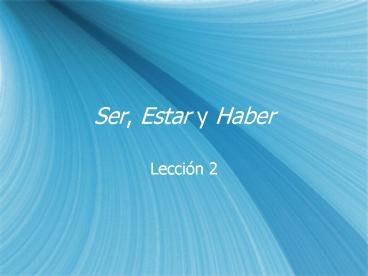Ser, Estar y Haber PowerPoint PPT Presentation
1 / 28
Title: Ser, Estar y Haber
1
Ser, Estar y Haber
- Lección 2
2
Uses of SerDIP
- DESCRIBES -
- Origin, material, possession (ser de)
- Relationships
- Physical attributes/Characteristics of the
subject - Personality traits
- Profession
- Religion
- Nationality
- Identification of the subject
- Natural color
- Date and time
- Place and date of SPECIFIC event
3
- IMPERSONAL EXPRESSIONS
- PASSIVE VOICE (ser participle por)
4
Origin, material, possessions(ser de )
- Yo soy de Minnesota.
- La mesa es de madera.
- La mochila es de Lola.
- Héctor es de Guatemala.
- El tanque es de acero.
- Las bolsas de plástico son de Luisa.
5
Relationships
- Paco es el hermano de Lola.
- Ella es la amiga de Susana.
6
Physical attributes/Characteristics of the subject
- Pablo es rubio.
- Juan es alto.
- El carro es rápido.
- El mundo es redondo.
- El petróleo es negro.
7
Personality traits
- Nosotros no somos atletas.
- Juana es una persona feliz.
8
Profession
- Ella es abogada.
- Los expertos eran científicos.
- Neil Armstrong es astronauta.
9
Religion
- Mi novia es hindú.
- Ellos son cristianos.
- Ella era musulmana.
- Julia es católica.
10
Nationality
- Héctor es guatemalteco.
- Nosotros somos estadounidenses.
- Alicia es cubana.
11
Identification of the subject
- Es una mesa.
- Soy Paco.
- Es el chico nuevo.
- Es la profesora de español.
- Es la cantante.
- El el detective privado.
- Nosotros no somos atletas.
12
Natural color
- La yerba es verde.
- La nieve es blanca.
- El cielo es azul.
13
Date, time, days of the week, months, seasons
- Era jueves, el 13 de octubre del 2008.
- Hoy es viernes.
- Es invierno y hace mucho frío.
14
Place and date of specific events
- La conferencia fue en el auditorio.
- Las entrevistas son a las ocho.
- El concierto de Juanes es en Miami.
- El juego de fútbol americano es el domingo.
15
Impersonal expressions
- Es alarmante que en México haya tanta
contaminación.
16
Passive voice(w/past participle)
- Las playas fueron contaminadas por la gente.
In the passive voice, the subject is acted upon
by a person or persons introduced by por, and
that the past participle agrees in gender and
number with the subject.
17
Uses of EstarPLACE
- With PAST PARTICIPLE
- Result of an action
- LOCATION
- ACTION in the PROGRESSIVE
- CHANGE FROM THE NORM
- Unnatural color or condition
- Going from the general to the particular
- Temporary physical condition
- EMOTIONAL/MENTAL STATE
- mood
For a specific event use ser!
18
With PAST PARTICIPLEresult of a previous action
- La playa está contaminada.
- Estoy sentado.
- Estás de pie.
- La mosca está muerta.
19
Location
- Yo estoy en la clase de español.
- El astronauta está en la luna.
- El aguajero de la capa de ozona está sobre el
Polo Sur. - Los libros están debajo de los pupitres.
20
Action in the Progressive(estar -ndo
construction)
- La fábrica petroquímica estaba reciclando sus
desechos. - Estábamos estudiando anoche.
- Estoy practicando el español.
21
Change from the Norm -whether perceived or real
22
Unnatural color
- El cielo está gris.
- La yerba está marrón.
23
Going from the general to the specific -
- Este café está muy bueno. (indicating that this
particular cup of coffee is very good!) - Este café está malísimo. (indicates this cup of
coffee is horrible)
24
Temporary physical condition/condition
- Ella está bien.
- Ellos están enfermos.
- Yo estoy cansada.
- Estás muy flaca.
- El agua del mar está fría para ser agosto.
25
Emotional/Mental state
- El paciente estaba deprimido cuando llegué.
- Ellos están tristes.
- Ella está de mal humor.
- Estoy muy feliz hoy!
26
Change of Meaning
27
(No Transcript)
28
Uses of Haber
- AUXILIARY VERB
- Perfect tenses
- EXISTENCE OF NOUNS
- 3rd person singular (hay, había, habrá)
- MUST
- Hay que infinitive to indicate MUST

